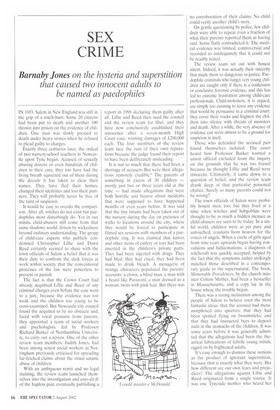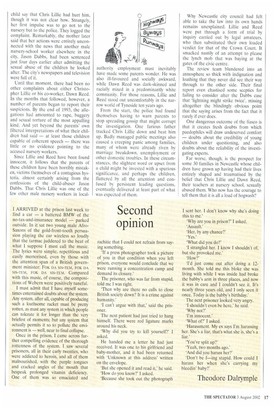SEX CRIME
Barnaby Jones on the hysteria and superstition
that caused two innocent adults to be named as paedophiles
IN 1693, Salem in New England was still in the grip of a witch-hunt. Some 20 citizens had been put to death and another 100 thrown into prison on the evidence of children. One man was slowly pressed to death under heavy stones when he refused to plead guilty to charges.
Exactly three centuries later, the ordeal of two nursery-school teachers in Newcastle upon Tyne began. Accused of sexually abusing dozens or even hundreds of children in their care, they too have had the living breath squeezed out of them during the decade it has taken to clear their names. They have fled their homes, changed their identities and lost their partners. They will probably never be free of the taint of suspicion.
It would be easy to overdo the comparison. After all, witches do not exist but paedophiles most disturbingly do. Yet in our minds, child-abusers still come from that same shadowy world, driven by wickedness beyond ordinary understanding. The group of child-care experts who publicly condemned Christopher Lillie and Dawn Reed certainly seemed to share with the town officials of Salem a belief that it was their duty to confront the dark forces at work within society that the conventional processes of the law were powerless to prevent or punish.
The fact is that the Crown Court had already acquitted Lillie and Reed of any criminal charges even before the case went to a jury, because the evidence was too weak and the children too young to be cross-examined. But Newcastle city council found the acquittal to be no obstacle and. faced with vocal pressure from parents, they appointed a team of social workers and psychologists, led by Professor Richard Barker of Northumbria University, to carry out a review. One of the other review team members, Judith Jones, had been among senior social workers at Nottingham previously criticised for spreading far-fetched claims about the ritual satanic abuse of children.
With an ambiguous remit and no legal training, the review team launched themselves into the investigation and auto-da-0 of the hapless pair, eventually publishing a report in 1998 declaring them guilty after all. Lillie and Reed then sued the council and the review team for libel, and they have now conclusively established their innocence after a seven-month High Court case. winning damages of £200,000 each. The four members of the review team face the ruin of their own reputations because the judge found their report to have been deliberately misleading.
It is not so much that there had been a shortage of accusers. But were their allegations remotely credible? The parents of something in excess of 30 children — mostly just two or three years old at the time — had made allegations that were both horrific and bizarre about incidents that were supposed to have happened months or even years before. It was said that the tiny infants had been taken out of the nursery during the day on pretence of walks to locations around the city, where they would be forced to participate in filmed sex sessions with members of a paedophile ring. It was claimed that knives and other items of cutlery or toys had been inserted in the children's private parts. They had been injected with drugs. They had bled, they had cried, they had been made to drink bleach. A menagerie of strange characters populated the parents' accounts: a clown, a blind man, a man with a beard like Pavarotti, a man dressed as a woman, twins with pink hair. But there was no corroboration of their claims. No child could verify another child's story.
On gentle questioning by police, few children were able to repeat even a fraction of what their parents reported them as having said. Some flatly contradicted it. The medical evidence was limited, controversial and recorded so inadequately that it could not be readily tested.
The review team set out with honest intent. Indeed, it was actually their sincerity that made them so dangerous to justice. Paedophile criminals who target very young children are caught only if there is a confession or conclusive forensic evidence, and this has led to extreme frustration among child-care professionals. Child-molesters, it is argued, are simply too cunning to leave any evidence that would be persuasive in a criminal court: they cover their tracks and frighten the children into silence with threats of monsters and death. After a while, the very absence of evidence can seem almost to be a ground for suspicion in itself.
Those who defended the accused pair found themselves isolated. The court heard how Professor Barker wanted a union official excluded from the inquiry on the grounds that he was too biased because he thought Lillie and Reed were innocent. Ultimately, it came down to a question of belief, and the review team drank deep of that particular poisoned chalice. Surely so many parents could not be wrong?
The town officials of Salem were probably honest men, too; but they lived at a time when witches and hobgoblins were thought to be as much a hidden menace as child-abusers are seen to be today. In a sinful world, children were as yet pure and untouched, conduits from heaven for the voices of angels. When a circle of girls aged from nine years upwards began having convulsions and hallucinations, a diagnosis of witchcraft was quickly accepted, helped by the fact that the symptoms rather strikingly matched those described in a contemporary guide to the supernatural. The book, Memorable Providences, by the church minister Cotton Mather, had been a bestseller in Massachusetts, and a copy lay in the house where the trouble began.
There was a strong inclination among the people of Salem to believe even the most fantastic ideas: that the accused had metamorphosed into spectres; that they had been spotted flying on broomsticks; and that they had instructed bees to deposit nails in the stomachs of the children. It was some years before it was generally admitted that the allegations had been the theatrical fabrications of febrile young minds, egged on by frightened adults.
It's easy enough to dismiss these notions as the product of ignorant superstition, because that is exactly what they were. But how different are our own fears and prejudices? The allegations against Lillie and Reed originated from a single source. It WaS one Tyneside mother who heard her
child say that Chris Lillie had hurt him, though it was not clear how. Strangely, her first impulse was to go not to the nursery but to the police. They logged the complaint. Remarkably, the mother later said that her actions were entirely unconnected with the news that another male nursery-school worker elsewhere in the city, Jason Dabbs, had been sentenced just four days earlier after admitting the sexual abuse of the children he looked after. The city's newspapers and television were full of it.
Until that moment, there had been no other complaints about either Christopher Lillie or his co-worker, Dawn Reed. In the months that followed, however, a number of parents began to report their suspicions. By the end of 1993, the allegations had amounted to rape, buggery and sexual torture of the most appalling kind. And yet beyond the parents' own filtered interpretations of what their children had said — at least those children capable of coherent speech — there was little or no evidence pointing to the accused nursery workers.
Since Lillie and Reed have been found innocent, it follows that the parents of these children have been horribly mistaken, victims themselves of a contagious hysteria, almost certainly arising from the confessions of the child-abuser Jason Dabbs. That Chris Lillie was one of the few other male nursery workers in local authority employment must inevitably have made some parents wonder. He was also ill-favoured and socially awkward, while Dawn Reed was dark-skinned and racially mixed in a predominantly white community. For those reasons, Lillie and Reed stood out uncomfortably in the narrow world of Tyneside ten years ago.
From the start, the police had found themselves having to warn parents to stop spreading gossip that might corrupt the investigation. One furious father tracked Chris Lillie down and beat him up. Badly managed public meetings also caused a creeping panic among families, many of whom were already riven by marriage breakdown, unemployment or other domestic troubles. In these circumstances, the slightest word or upset from a child might be invested with a spurious significance, and perhaps the children, flattered by all the attention and confused by persistent leading questions, eventually delivered at least part of what was expected of them. Why Newcastle city council had felt able to take the law into its own hands remains unexplained. Lillie and Reed were put through a form of trial by inquiry carried out by legal amateurs, who then substituted their own loaded verdict for that of the Crown Court. It smacked nastily of an attempt to please the lynch mob that was baying at the gates of the civic centre.
The review team blundered into an atmosphere so thick with indignation and loathing that they never did see their way through to the other side. Their final report even chastised some sceptics for failing to consider after the Dabbs case that 'lightning might strike twice', missing altogether the blindingly obvious point that the saying arises from the fact that it rarely if ever does.
One dangerous outcome of the fiasco is that it creates fresh doubts from which paedophiles will draw undeserved comfort — doubts about the credibility of young children under questioning, and also doubts about the reliability of the investigating experts.
Far worse, though, is the prospect for some 30 families in Newcastle whose children have grown up having had their lives entirely shaped and traumatised by the belief that Chris Lillie and Dawn Reed, their teachers at nursery school, sexually abused them. Who now has the courage to tell them that it is all a load of hogwash?



























































 Previous page
Previous page